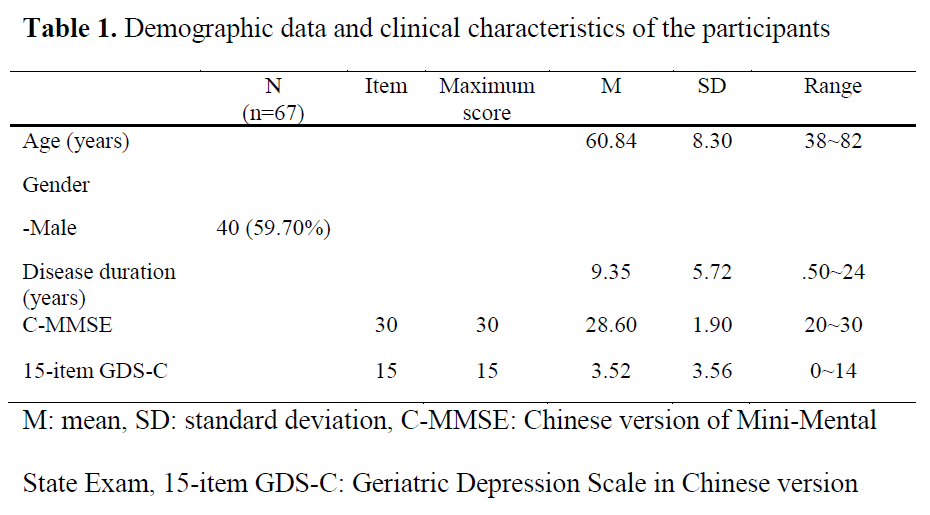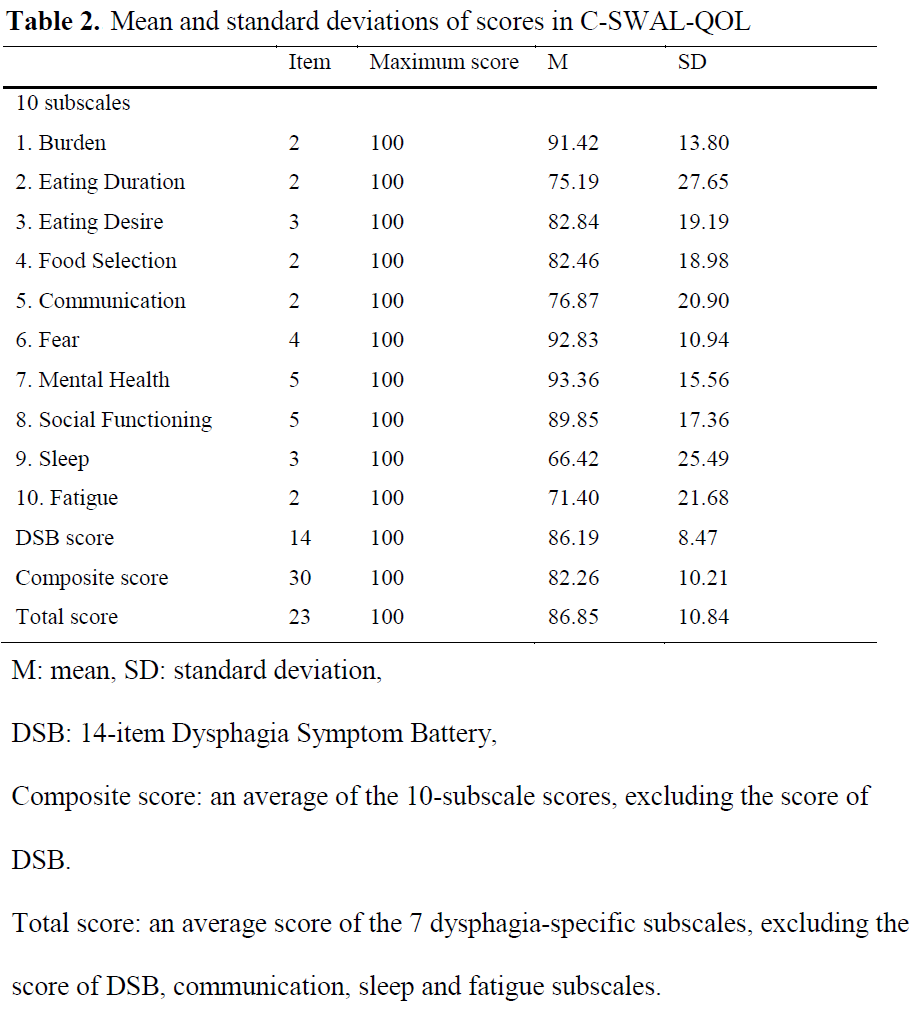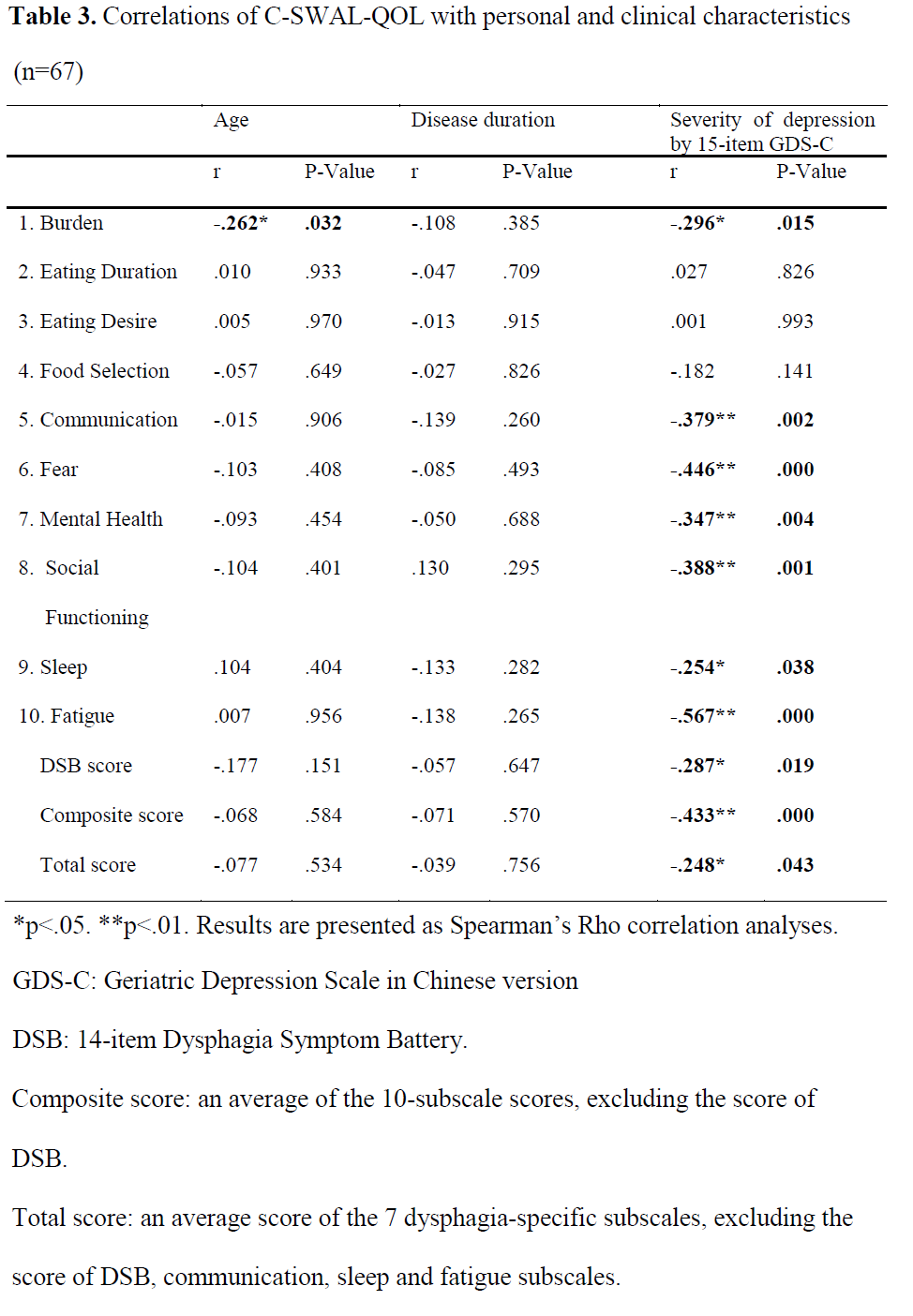Session Information
Date: Sunday, October 7, 2018
Session Title: Quality Of Life/Caregiver Burden in Movement Disorders
Session Time: 1:45pm-3:15pm
Location: Hall 3FG
Objective: The aims of this study include: (1) to evaluate swallowing-related Quality of Life (QoL) in PD by using the validated Chinese version of the Swallowing Quality-of-Life Questionnaire (C-SWAL-QOL); (2) to delineate potential relationship between the 10 subscales in C-SWAL-QOL and the score in the 14-item Dysphagia Symptom Battery (DSB), in order to evaluate if the severity of dysphagia symptoms is associated with each subscale score; and (3) to identify factors (socio-demographic variables and clinical variables) associated with swallowing-related quality of life by using C-SWAL-QOL.
Background: Parkinson’s disease (PD) is the second most prevalent neurodegenerative disease in the world. With the aging population worldwide, the prevalence of PD is expected to soar. Along its course of development, ninety percent of the PD patients develop dysphagia, with aspiration pneumonia as the leading cause of death. Swallowing dysfunction can take place during any of the swallow phases and are usually caused by movement impairment of affected bulbar structures.
Methods: As shown in [Table 1], C-SWAL-QOL was administered to 67 subjects with PD after cognitive assessment. After the completion of C-SWAL-QOL, participants were also asked to fill out the 15-item Geriatric Depression Scale in Chinese version (GDS-C), which is a self-report depression assessment. A series of non-parametric Spearman’s Rho correlation analyses were performed to examine the relationship between the 10-subscale scores in C-SWAL-QOL and (1) age, (2) disease duration, (3) depression and (4) the 14-item DSB. Correlations were regarded as weak if |r|<0.3, moderate if 0.3≤|r|<0.5, strong if 0.5≤|r|<0.7, and very strong if |r|≥0.7.
Results: As presented in [Table 2], it is found that sleep, fatigue, eating duration and communication were the most severely affected subscales in C-SWAL-QOL incurred by PD. [Table 3] shows that significant relationships existed between composite C-SWAL-QOL score (rho = -.433, p = 0.000), total C-SWAL-QOL score (rho = -.248, p = 0.043), DSB score (rho = -.287, p = 0.019) and depression. Significant relationships were also observed between subscales of communication (rho = -.379, p = 0.002), fear (rho = -.446, p = 0.000), mental health (rho = -.347, p =0.004), social functioning (rho = -.388, p = 0.001), fatigue (rho = -.567, p = 0.000) and depression. Yet, no relationships existed between score of C-SWAL-QOL and age or disease duration in PD.
Conclusions: Most of the subscales in C-SWAL-QOL measures swallowing-related quality of life accurately in PD. The current findings reveal that the worse the depression (e.g. higher the GDS-C score), the worse the swallowing-related quality of life (e.g. lower the C-SWAL-QOL score). Results in this study shed light on the psychosocial sequelae that dysphagia can have in PD patients. Further studies using the Hoehn and Yahr staging or Unified Parkinson’s Disease Rating Scale (UPDRS) to compare the C-SWAL-QOL score of Chinese PD patients at different stages is recommended.
References: 1) McHorney CA, Robbins J, Lomax K, Rosenbek JC, Chignell K, Kramer AE, et al. The SWAL-QOL and SWAL-CARE outcomes tool for oropharyngeal dysphagia in adults: III. documentation of reliability and validity. Dysphagia 2002;17:97-114. 2) Lam PM, Lai CK. The validation of the Chinese version of the Swallow Quality-of-Life Questionnaire (SWAL-QOL) using exploratory and confirmatory factor analysis. Dysphagia 2011;26:117-24.
To cite this abstract in AMA style:
H.F. Chan, H. Kim, M. Ng, DY. Kim. Application of Chinese version of SWAL-QOL in Parkinson’s Disease [abstract]. Mov Disord. 2018; 33 (suppl 2). https://www.mdsabstracts.org/abstract/application-of-chinese-version-of-swal-qol-in-parkinsons-disease/. Accessed February 5, 2026.« Back to 2018 International Congress
MDS Abstracts - https://www.mdsabstracts.org/abstract/application-of-chinese-version-of-swal-qol-in-parkinsons-disease/



